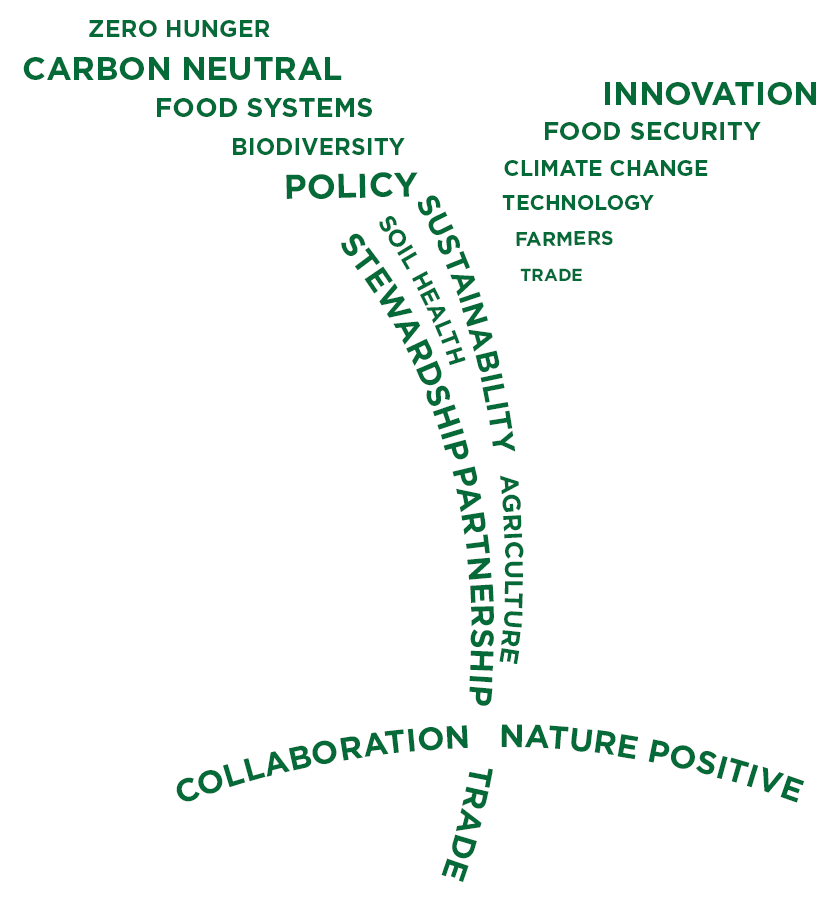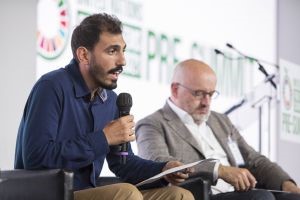By: CropLife International
A perspective from Robert Hunter, Chief Operating Officer, CropLife International
The spirit of cooperation, collaboration, and partnership is a core value for CropLife International and our industry. Throughout the year, we continued to challenge ourselves to advance innovation in agriculture for a sustainable future and find new opportunities to work with stakeholders in a more integrated way. This is not only with our members and our global CropLife network, but also by forging new partnerships to foster innovative solutions to the pressing challenges of food security, biodiversity, and climate change.
Over the years, our commitment to collaboration has provided us with great opportunities to work with stakeholders such as FAO, USAID, GlobalG.A.P., the Rainforest Alliance, the World Bank, and GIZ. CropLife International and our global network are well-known for building more than 300 partnerships with international organizations and local NGOs to build capacity and train farmers on integrated pest management (IPM) and responsible use of plant science technologies.
This year presented new opportunities for us to establish partnerships and gain momentum in bringing our vision for sustainable food systems to the forefront of the discussion. Key activities are summarized below.

- To kick off 2021, CropLife International served on the advisory committee of a new Global Agriculture Innovation Forum, a joint undertaking between the US Department of Agriculture’s Foreign Agricultural Service (USDA FAS) and Purdue University’s Office of International Programs in Agriculture. The Forum consisted of a series of virtual events held throughout the year that brought together innovators and stakeholders within the public and private sectors to discuss innovations that enable sustainable agriculture globally, ranging from reducing postharvest losses to making improved animal genotypes available to smallholder farmers.
- With support from CropLife International, the Network of African Science Academies (NASAC) and Africa Harvest developed a coalition of African academic scientists who are interested in promoting the benefits of genome editing as an essential element of plant breeding in Africa. The nascent and loose coalition is in the early stages of formalizing its mandate under NASAC, and should be able to expand the number of scientific advocates based in Africa beyond those who have been active in the genetically modified crops discussion.
- Planning for the UN Food Systems Summit (FSS) in September and Pre-Summit in July heightened the global conversation around systems-based approaches to sustainable food systems. By engaging with a diverse group of stakeholders, ranging from academia and civil society to finance and government, we elevated the imperative of continuing or accelerating agricultural innovation. It was also an opportunity to highlight the important role our technologies play in delivering sustainable food systems. We also helped galvanize our industry and global network to mobilize in the Food Systems Summit Action Track working groups and engage with member state delegations in the lead-up to and during the Summit events.
- As a result of conversations and coalitions emerging from the Summit, we recognized that soil health – and its importance in achieving the SDGs – was an opportunity to catalyze real action and demonstrate the value our industry can play in improving soil health and mitigating and adapting to climate change; therefore, we’re proud to support the Private Sector Call to Action for Soil Health, which includes agricultural input companies, food companies, financial institutions, and other organizations. The Private Sector Call to Action for Soil Health evolved to support the goals and objectives outlined by the Coalition of Action 4 Soil Health (CA4SH), a multi-stakeholder coalition built to facilitate the implementation, adoption, and global coordination of soil restoration practices, and to recognize the need for private sector participation and engagement of farmers, acknowledge tangible outcome-related goals and solutions, highlight the work that is being accomplished through existing initiatives and alliances, and emphasize the need for science-based approaches and measurements.
- Launched at the UN Food Systems Summit in September, we joined with like-minded countries and organizations in supporting the formation of the Sustainable Productivity Growth for Food Security and Resource Conservation, recognizing that a Coalition of Action focused on sustainable productivity growth could help break silos and deliver on agricultural productivity growth’s potential to accelerate progress in meeting the world’s growing nutrition needs without bankrupting farmers, consumers, and nature. The Coalition includes a wide range of partners, ranging from governments and NGOs to industry and academia.
- Originally announced at the UN Food Systems Summit, the Agriculture Innovation Mission for Climate (AIM4C) coalition was officially launched alongside 31 countries and 48 non-government partners at the United Nations Climate Change Conference (COP26). The initiative aims to accelerate investment in sustainable agriculture and food systems innovation and has already raised more than $4 billion in innovation investments.As an Innovation Sprint Partner, CropLife International will work with AIM4C to make agriculture more climate-friendly through our Sustainable Pesticide Management Framework (SPMF). This $13-million plan will improve access to and uptake of climate-smart crop protection innovations to smallholder farmers in nine different markets in Asia, Africa, and Central America over the next six years by:
- Increasing access to newer crop protection chemistries (including biological pesticides).
- Training extension officers and farmers on the effective and safe use of crop protection products and the importance of integrated pest management solutions.
- Supporting policy and regulatory reform that enables access to these innovations.
Implementation of the framework is already underway in Kenya, and additional projects will be launched in Thailand, Morocco, and Vietnam in 2022.
- Also at COP26, we collaborated with groups as diverse as the International Chamber of Commerce, the World Farmers’ Organization, USAID, and World Business Council for Sustainable Development to continue to elevate the importance of agricultural innovation in delivering nature-positive, carbon-neutral food systems.
We will carry this momentum forward into 2022 as we continue to develop and drive a thought leadership program by engaging in open dialogue with various stakeholders around innovative, sustainable food systems. We recognize our work is not without its challenges, but we are committed to listening and working in partnership with all key stakeholders to achieve our shared ambitions.


